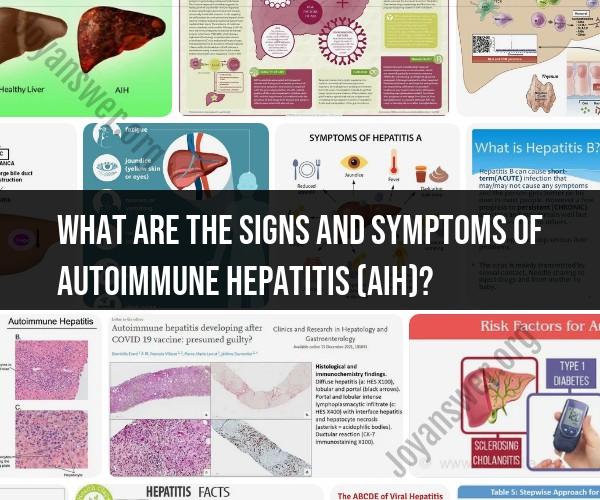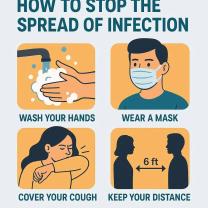What are the signs and symptoms of autoimmune hepatitis (AIH)?
Autoimmune hepatitis (AIH) is a chronic liver disease that can present with various signs and symptoms. The severity of symptoms can vary among individuals, and some people with AIH may not experience noticeable symptoms until the disease has progressed. Here are some common signs and symptoms of autoimmune hepatitis:
Fatigue: Fatigue is a prevalent symptom in individuals with AIH. It can range from mild to severe and may significantly affect daily activities.
Jaundice: Jaundice is characterized by yellowing of the skin and the whites of the eyes (sclera). It occurs due to the buildup of bilirubin, a pigment produced by the liver. Jaundice is often one of the first visible signs of liver dysfunction.
Abdominal Discomfort: Some individuals with AIH may experience mild to moderate abdominal discomfort or pain in the upper right side of the abdomen, where the liver is located.
Joint Pain: Joint pain and stiffness can occur in AIH and may resemble symptoms of arthritis.
Itching (Pruritus): Itching of the skin, known as pruritus, can result from the accumulation of certain substances in the bloodstream when the liver is not functioning correctly.
Loss of Appetite: People with AIH may experience a reduced appetite, which can lead to unintended weight loss.
Nausea and Vomiting: Some individuals may have nausea and occasionally vomit.
Enlarged Liver (Hepatomegaly): An enlarged liver can sometimes be felt as a firm mass in the upper right abdomen.
Enlarged Spleen (Splenomegaly): In some cases, AIH may also cause enlargement of the spleen, which can lead to discomfort or fullness in the left upper abdomen.
Dark Urine: Urine may become darker in color due to the presence of bilirubin.
Light-Colored Stools: Stools may become pale or clay-colored, which can be a sign of reduced bilirubin excretion by the liver.
Flu-Like Symptoms: Some individuals with AIH may experience flu-like symptoms, such as low-grade fever, muscle aches, and malaise.
Spider Angiomas: These are small, spider-like blood vessels that may appear on the skin, particularly on the upper body and face.
It's important to note that the presentation of AIH can be highly variable, and not everyone with the condition will experience all of these symptoms. Additionally, some individuals with AIH may not have noticeable symptoms, and the disease may be detected through routine blood tests or during medical evaluation for other reasons.
If you or someone you know is experiencing symptoms suggestive of AIH, especially jaundice, abdominal discomfort, or unexplained fatigue, it's essential to seek medical attention promptly. Early diagnosis and treatment are crucial for managing AIH and preventing long-term liver damage. AIH is typically diagnosed through blood tests, liver function tests, and, in some cases, a liver biopsy to assess the extent of liver inflammation and damage.
Recognizing Autoimmune Hepatitis: Common Signs and Symptoms
Autoimmune hepatitis (AIH) is a chronic liver disease that occurs when the body's immune system attacks the liver cells. This can cause inflammation and damage to the liver. AIH can occur at any age, but it is most common in young women.
The most common symptoms of AIH include:
- Fatigue
- Jaundice (yellowing of the skin and eyes)
- Dark-colored urine
- Light-colored stools
- Abdominal pain
- Loss of appetite
- Nausea and vomiting
- Itching
- Joint pain
- Rash
In some cases, AIH may not cause any symptoms, and it may only be diagnosed during a routine blood test.
The Telltale Signs of Autoimmune Hepatitis (AIH): What to Watch For
Some of the telltale signs of AIH include:
- Fatigue: This is one of the most common symptoms of AIH and can be so severe that it interferes with daily activities.
- Jaundice: This is a yellowing of the skin and eyes that occurs when bile builds up in the bloodstream.
- Dark-colored urine and light-colored stools: These are signs that the liver is not functioning properly.
- Abdominal pain: This can be a sign of inflammation in the liver.
- Loss of appetite, nausea, and vomiting: These are all symptoms of liver disease.
- Itching: This is a common symptom of liver disease and can be severe.
- Joint pain: This is another common symptom of liver disease and can affect the hands, wrists, knees, and ankles.
- Rash: This is a less common symptom of AIH, but it can occur.
If you experience any of these symptoms, it is important to see a doctor to get a diagnosis and start treatment.
Navigating Autoimmune Hepatitis: Identifying Symptoms and Seeking Help
If you think you may have AIH, it is important to see a doctor to get a diagnosis and start treatment. There is no cure for AIH, but early diagnosis and treatment can help to manage the condition and prevent complications.
To diagnose AIH, your doctor will typically perform a blood test to look for elevated liver enzymes and antibodies. They may also order an imaging test, such as an ultrasound or biopsy, to get a better look at the liver.
Once you have been diagnosed with AIH, your doctor will work with you to develop a treatment plan. The goal of treatment is to suppress the immune system and reduce inflammation in the liver. The most common treatment for AIH is a medication called prednisone. Other medications, such as azathioprine and mycophenolate, may also be used.
In some cases, a liver transplant may be necessary if the liver damage is severe.
In addition to medication, there are a number of lifestyle changes that you can make to manage your AIH. These changes include:
- Eating a healthy diet
- Maintaining a healthy weight
- Avoiding alcohol
- Exercising regularly
- Getting regular checkups from a doctor
By following your treatment plan and making healthy lifestyle changes, you can often live a long and healthy life with AIH.
If you have any questions or concerns about AIH, please talk to your doctor.













